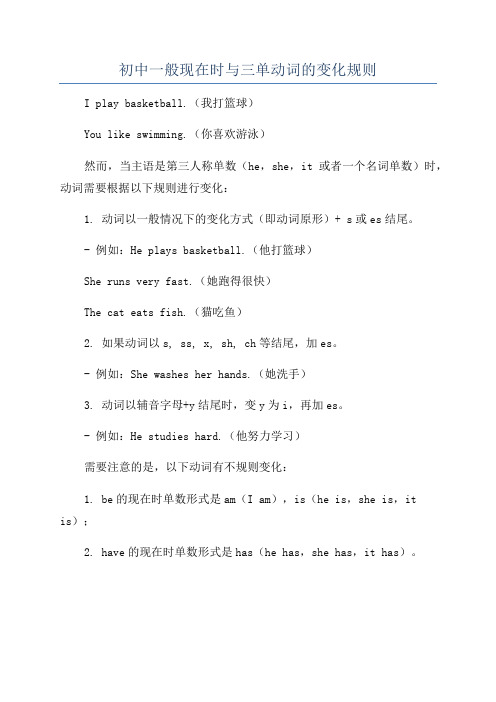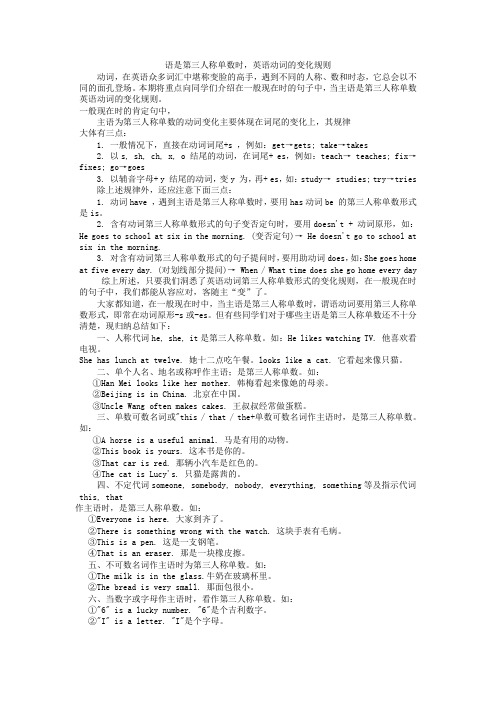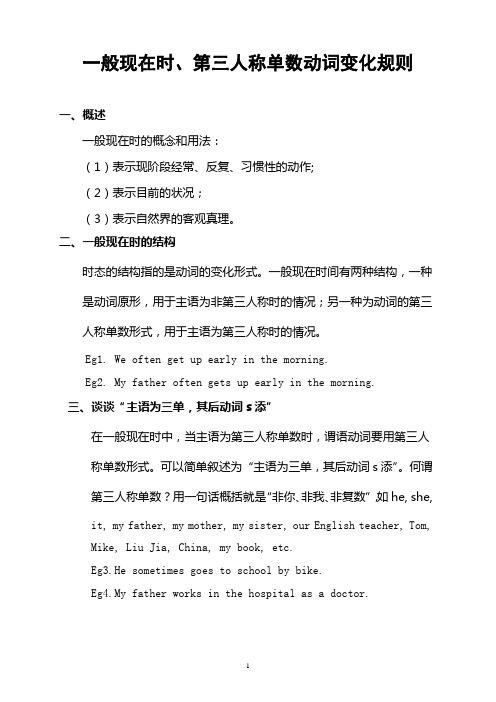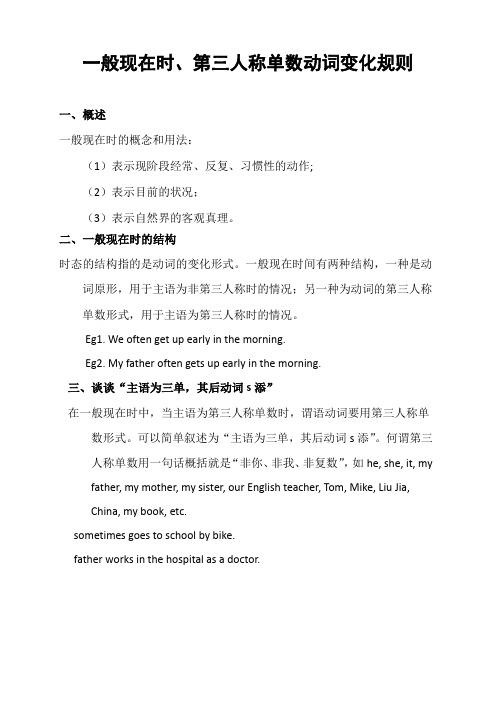一般现在时主语三单的动词变化及练习教学提纲
初中一般现在时与三单动词的变化规则

初中一般现在时与三单动词的变化规则
I play basketball.(我打篮球)
You like swimming.(你喜欢游泳)
然而,当主语是第三人称单数(he,she,it或者一个名词单数)时,动词需要根据以下规则进行变化:
1. 动词以一般情况下的变化方式(即动词原形)+ s或es结尾。
- 例如:He plays basketball.(他打篮球)
She runs very fast.(她跑得很快)
The cat eats fish.(猫吃鱼)
2. 如果动词以s, ss, x, sh, ch等结尾,加es。
- 例如:She washes her hands.(她洗手)
3. 动词以辅音字母+y结尾时,变y为i,再加es。
- 例如:He studies hard.(他努力学习)
需要注意的是,以下动词有不规则变化:
1. be的现在时单数形式是am(I am),is(he is,she is,it is);
2. have的现在时单数形式是has(he has,she has,it has)。
一般现在时第三人称单数动词变化规则(小学1-6年级单词总结)5则范文

一般现在时第三人称单数动词变化规则(小学1-6年级单词总结)5则范文第一篇:一般现在时第三人称单数动词变化规则(小学1-6年级单词总结)小学1-6年级单词总结(2013)外研社新标准英语课本青岛市市北区邢老师英语辅导班编制动词第三人称单数的变化规则(小学1-6年级水平的单词总结)1、直接在动词后+ssay says;stay stays;read reads;draw draws;listen listens;start starts;ring rings;stop stops;open opens;run runs;wait waits;arrive arrives;like likes;play plays.......等等。
2、以ss, x, sh, ch, 接尾的动词:+esmiss misses;fix fixes;teach teaches;watch watches;match matches;wash washes: finish finishes;brush brushes;3、以辅音+y接尾的动词:去y变i+es fly flies;try tries;cry cries;copycopies;study studies;carry carries;reply replies;tidy tidies;4、以辅音+o接尾的动词:+esgo goes;do does;5、不规则变化的动词:have has;编者愿意贡献版权欢迎免费复制传阅请勿改动 catch worry 为了孩子 catches;worries;第二篇:第三人称单数时的动词变化第三人称单数时的动词变化 1.一般情况下,动词词尾加S2.以字母s,x,ch,sh结尾,动词词尾加es。
3.以辅音加y结尾,把y改成i再加es。
4.以o结尾,动词词尾加es。
5.特殊变化:have-has wash__________ go__________ ask___________ fly____________ stay_________ drink__________ have_________ miss_________ come___________ study_______ catch__________ sing___________ go_________ work____________ do_________ 用动词适当形式填空1.He often ________(have)dinner at home.2.He ________(want)to watch TV every day.3.Do they_______(like)to see a film about spaceship?4.My parents_________(read)newspapers everyday.5.The woman________(teach)us English.6.Don’t _______(swim)in the lake.第三人称单数时的动词变化 1.一般情况下,动词词尾加S2.以字母s,x,ch,sh结尾,动词词尾加es。
主语是第三人称单数时,英语动词的变化规则

语是第三人称单数时,英语动词的变化规则动词,在英语众多词汇中堪称变脸的高手,遇到不同的人称、数和时态,它总会以不同的面孔登场。
本期将重点向同学们介绍在一般现在时的句子中,当主语是第三人称单数英语动词的变化规则。
一般现在时的肯定句中,主语为第三人称单数的动词变化主要体现在词尾的变化上,其规律大体有三点:1. 一般情况下,直接在动词词尾+s ,例如:get→gets; take→takes2. 以s, sh, ch, x, o 结尾的动词,在词尾+ es,例如:teach→ teaches; fix→fixes; go→goes3. 以辅音字母+ y 结尾的动词,变y 为,再+ es,如:study→ studies; try→tries除上述规律外,还应注意下面三点:1. 动词have ,遇到主语是第三人称单数时,要用has动词be 的第三人称单数形式是is。
2. 含有动词第三人称单数形式的句子变否定句时,要用doesn't + 动词原形,如:He goes to school at six in the morning. (变否定句)→ He doesn't go to school at six in the morning.3. 对含有动词第三人称单数形式的句子提问时,要用助动词does,如:She goes home at five every day. (对划线部分提问)→ When / What time does she go home every day 综上所述,只要我们洞悉了英语动词第三人称单数形式的变化规则,在一般现在时的句子中,我们都能从容应对,客随主“变”了。
大家都知道,在一般现在时中,当主语是第三人称单数时,谓语动词要用第三人称单数形式,即常在动词原形-s或-es。
但有些同学们对于哪些主语是第三人称单数还不十分清楚,现归纳总结如下:一、人称代词he, she, it是第三人称单数。
一般现在时主语是第三人称单数时动词的变化规则教程文件

一般现在时主语是第三人称单数时动词的变化规则
木质、石质、骨质、琉璃、藏银……一颗颗、一粒粒、一片片,都浓缩了自然之美,展现着千种风情、万种诱惑,与中国结艺的朴实形成了鲜明的对比,代表着欧洲贵族风格的饰品成了他们最大的主题。1、一般情况下,动词后直接加s,
§8-2购物环境与消费行为2004年3月20日如:works,gets,reads等。
2、以s,x,ch,sh或o结尾的动词,在后面加es,
(一)DIY手工艺品的“多样化”如:goes,teaches,washes等。
2、传统文化对大学生饰品消费的影响
500元以上1224%2、传统文化对大学生饰品消费的影响3、以辅音字母加y结尾的动词,把y变为i,再加es,
(二)DIY手工艺品的“热卖化”如:study--studies,try--tries,carry--carries等。
关于DIY手ห้องสมุดไป่ตู้艺制品的消费调查
标题:手工制作坊2004年3月18日世界上的每一个国家和民族都有自己的饰品文化,将这些饰品汇集到一起再进行新的组合,便可以无穷繁衍下去,满足每一个人不同的个性需求。4、动词have遇在主语是第三人称单数时,have改为has,
如:He has an interesting book .
一般现在时动词第三人称单数变化规则讲义与试题

一般现在时、第三人称单数动词变化规则一、概述一般现在时的概念和用法:(1)表示现阶段经常、反复、习惯性的动作;(2)表示目前的状况;(3)表示自然界的客观真理。
二、一般现在时的结构时态的结构指的是动词的变化形式。
一般现在时间有两种结构,一种是动词原形,用于主语为非第三人称时的情况;另一种为动词的第三人称单数形式,用于主语为第三人称时的情况。
Eg1. We often get up early in the morning.Eg2. My father often gets up early in the morning.三、谈谈“主语为三单,其后动词s添”在一般现在时中,当主语为第三人称单数时,谓语动词要用第三人称单数形式。
可以简单叙述为“主语为三单,其后动词s添”。
何谓第三人称单数?用一句话概括就是“非你、非我、非复数”,如he, she, it, my father, my mother, my sister, our English teacher, Tom, Mike, Liu Jia, China, my book, etc.Eg3.He sometimes goes to school by bike.Eg4.My father works in the hospital as a doctor.四、一般现在时的肯定句中,主语为第三人称单数的动词变化主要体现在词尾的变化上,其规律为:(与名词变成复数的变法大致相同。
)五、一般现在时的句子转换(1)当句子中有be动词或情态动词时,则把be动词或情态动词(can,could等等)提到主语的前面变成一般疑问句;在be动词或情态动词后面加not变成否定句.例:①陈述句:She is a student.一般疑问句→Is she a student?否定句→She is not a student.②陈述句:I can swim.一般疑问句→ Can you swim(2)当句子中即没有be动词,也没有情态动词时,则在主语前加助动词do (you,以及复数), does(单数she,he,it)变成一般疑问句;在主语后谓语动词前加助动词don’t(I,you,以及复数), doesn’t(单数she,he,it)变成否定句,助动词后的动词要变成动词原形。
小学英语一般现在时三单动词的变化规则及练习题资料讲解

小学英语一般现在时三单动词的变化规则及练习题一般现在时三单动词的变化规则及练习题1. 一般情况下,直接加-s2.以s. x. sh. ch. o纟吉尾,加-es3.以“辅音字母+y”结尾,变y为i,再加-es一、写出下列动词的第三人称单数drink ________ go _______ s tay ________ make _______ look ____ ___ have _______ pass _______ c arry ____ come ________ watch_ ___ sing ________ fly _________ s tudy ____ brush ________ do ____ ___ teach _______二、用括号内动词的适当形式填空。
1. He ofte n _______ (have) dinner at home.2. Dan iel and Tommy __ ___________ (be) in Class On e.3. We _ (not watch) TV on Mo nday.4 .Nick ______ (not go) to the zoo on Sun day.5. What ______ they ofte n ______ (do) on Sun days?6. ______ your mother _______ (read) n ewspapers every day?7. Mike _______ (like) cook in g. 8. I ________ (be) ill. I'm in bed. 9. Liu Tao ________ (do) not like PE. 10. The child ofte n ___ ___ (watch) TV in the eve ning.三、按照要求改写句子1. He watches TV every evening.改为否定句)2. I do my homework every day.(改为一般疑问句,作否定回答)________________________________________________________3. She likes books•改为一般疑问句,做肯定回答)4. Amy likes playi ng computer games.改为一般疑问句,作否定回答)_______________________________________________________________5. We go to school on Sun days 改为否定句)四、改错伐出错误的地方,将正确的写在横线上)1. Is your brother like En glish? ___________________2. Does he likes swimmi ng? _____________________3. He likes play games. ____________________4. Shedo n' do her homework on Sun days. ________________五、把句子补充完整。
一般现在时动词第三人称单数变化规则讲义与试题

一般现在时、第三人称单数动词变化规则一、概述一般现在时的概念和用法:(1)表示现阶段经常、反复、习惯性的动作;(2)表示目前的状况;(3)表示自然界的客观真理。
二、一般现在时的结构时态的结构指的是动词的变化形式。
一般现在时间有两种结构,一种是动词原形,用于主语为非第三人称时的情况;另一种为动词的第三人称单数形式,用于主语为第三人称时的情况。
Eg1. We often get up early in the morning.Eg2. My father often gets up early in the morning.三、谈谈“主语为三单,其后动词s添”在一般现在时中,当主语为第三人称单数时,谓语动词要用第三人称单数形式。
可以简单叙述为“主语为三单,其后动词s添”。
何谓第三人称单数用一句话概括就是“非你、非我、非复数”,如he, she, it, my father, my mother, my sister, our English teacher, Tom, Mike, Liu Jia,China, my book, etc.sometimes goes to school by bike.father works in the hospital as a doctor.四、一般现在时的肯定句中,主语为第三人称单数的动词变化主要体现在词尾的变化上,其规律为:(与名词变成复数的变法大致相同。
)五、一般现在时的句子转换(1)当句子中有be动词或情态动词时,则把be动词或情态动词(can,could 等等)提到主语的前面变成一般疑问句;在be动词或情态动词后面加not变成否定句.例:①陈述句:She is a student.一般疑问句→Is she a student否定句→She is not a student.②陈述句:I can swim.一般疑问句→Can you swim否定句→I can not swim.(2)当句子中即没有be动词,也没有情态动词时,则在主语前加助动词do (you,以及复数), does(单数she,he,it)变成一般疑问句;在主语后谓语动词前加助动词don’t(I,you,以及复数), doesn’t(单数she,he,it)变成否定句,助动词后的动词要变成动词原形。
一般现在时主语单三人称时的动词变化

一般现在时主语单三人称时的动词变化第一篇:一般现在时主语单三人称时的动词变化一般现在时主语单三人称时的动词变化①在一般现在时中,当主语为第三人称单数时,动词要用“s”型(即第三人称单数形式)。
②所谓动词“s”型的构成,可按名词变复数的规则来记,即:i)在动词尾直接加s。
如:play—plays,want—wants,work—works,know—knows,help—helps,get—gets ii)以字母s、x、ch或o结尾的动词加-es;如: guess—guesses,fix—fixes,teach—teaches,brush—brushes,go—goes,do—does,watch—watches,catch—catchesiii)以辅音字母+y结尾的动词,先变y为i,再加-es。
如:study—studies,carry—carries,fly—flies,worry—worries iv)③④强调如何将主语是第三人称单数的肯定句变为否定和疑问句。
现举例说明(用划线部分来说明顺口溜):1)His mother works in a factory.His mother doesn’t work in a factory.Does his mother work in a factory?2)Mr Li teaches us English.Mr Li doesn’t teach us English.Does Mr Li teach you English?3)My brother studies maths well.My brother doesn't study maths well.Does your brother study maths well?第二篇:一般现在时主语第三人称时的动词变化一般现在时主语第三人称时的动词变化(名词的复数变化规律)①在一般现在时中,当主语为第三人称单数时,动词要用―s‖型(即第三人称单数形式)。
- 1、下载文档前请自行甄别文档内容的完整性,平台不提供额外的编辑、内容补充、找答案等附加服务。
- 2、"仅部分预览"的文档,不可在线预览部分如存在完整性等问题,可反馈申请退款(可完整预览的文档不适用该条件!)。
- 3、如文档侵犯您的权益,请联系客服反馈,我们会尽快为您处理(人工客服工作时间:9:00-18:30)。
一般现在时主语三单的动词变化及练习一般现在时主语单三人称时的动词变化①在一般现在时中,当主语为第三人称单数时,动词要用“ S”型(即第三人称单数形式)。
②所谓动词S”型的构成,与名词变复数相似,即:a) 在动词尾直接加&如:play —plays,want—wants,work —works,know —knows,help—helps,get—getsb) 以字母s、ss、x、ch、sh或o结尾的动词加-es;如:guess— guesses fix ——fixes,teach—teaches, brush — brushes,go—goes, do—does,watch—watches,catch—catchesc) 以辅音字母+ y结尾的动词,先变y为i,再加-es。
如:study —studies,carry —carries,fly —flies,worry —worries第三人称单数练习一•请选出正确的答案:1. She (like / likes) to play football.2. He (like / likes) drinking milk.3. I (like / likes) to watch TV.4. We (like / likes) to play badm inton.5. They (like / likes) to sing son gs.6. She (read / reads) books every day.7. He (play / plays) computer games every day.8. It (liste n / liste ns) to the radio every day.9. Linda (draw / draws) pictures every day.10. Jane and Linda (play / plays) football every day.二•请用动词的适当形式填空。
1. Let him _____ (play)basketball.2. Everyone ___ (kno w)what he really like.3. Those girls ___ (be)my sister.4. That girl ____ (call)me every Sun day.5. How __ (do)she ___ (spell)the word?6. He _______ TV every eve ning. (watch)7. We always _______ to school on foot. (go)8. Tom, with his classmates, ofte n ____ football after school. (play)9. Your shoes _______ un der the bed. (be)10. _____ h ere and ______ by me. (come, sta nd)11. His un cle usually ________ to work by bus. (go)12. I always ______ up at six in the mornin g.(get)13. Joh n _______ like his father. (look). 请用have 或has填空。
1. I ________ a nice picture.2. He ________ a good friend.3. They _________ some kites.4 . We ______ s ome flowers.5 . She ________ a duck.6 . My father _________ a new bike.7. Her mother _________ a vase.8. Our teacher ________ an English book.9. Our teachers ________ a basketball.10. ______________________ Their parents some story books.11. Nancy ______ many skirts.12. _____________ David some jackets.13. _________________ My friends a football.14. What do you _______ ?15. What does Mike ________ ?四.否定句:在动词前+doesn't或don't.1. She __________ (do)her homework every day.2. He __________ (live)i n Shan ghai.3. He __________ (n eed)a pair pf shoes.4. Danny __________ (see)the apple tree?5. She __________ (come)from America.6. The girl _________ (look)out of the win dow and sees many birds in the sky.五.Do还是Does我来选。
1. [Do/Does] ______ he watch TV at night? Yes he does.2. [Do/Does] ______ you go to school everyday? No, I don't.3. [Do/Does] ______ Jack and Peter like 即ples?4. [Do/Does] ______ Ti na go swimmi ng on Sun day?5. [Do/Does] they play football? Yes, they __ [do/does].6. [Do/Does] we have a good teacher? Yes, we [do/does].7. [Do/Does] they jump rope ? No, they _[do no t/does no t].8. [Do/Does] your dog walk in the zoo?9. [Do/Does] I have a big no se? No, you [do no t/does no t].10. [Do/Does] your cats eat fish? Yes, they .[do/does].11. [Do/Does] their mothers go shopp ing? No, they [do no t/does no t].12.I [do not/ does not] speak Japa nese. [Do/Does] you speak Japa nese?六.请用动词的适当形式填空。
1.thedesk (have)four legs?Yes, it does.2. she (do)her homework every day?Yes, she does.3. he (live)i n Jinan?No, he does n't.4. he (n eed)a pair of shoes?NO, h e does n't.5. Does Danny (see)the apple tree?6. she (come)from America?Yes, she ___ .7. ____ the girl ____ (look)out of the wi ndow and sees many birds in the sky? No, she ____ .8. Jenny runs home and ____ (sit) on the chair?七、选择题:1.1 ____ to school every day.A. goB. goesC. going2. He ____ teeth every morning.A. brushB. brushesC. brush ing3. The birds ___ singing.A. likeB. likesC. like to4. What does Lily _____ doin g?A. likeB. likesC. to5. _____ you like eati ng apples?A. DoB. DoesC. Doing6. _____ he swim every after noon?A. DoB. DoesC. Doing7. Tom likes ____ in the classroom.A. si ngi ngB. singC. to si nging8. -Does Sally like swimming?--No, she .A. doB. doesC. does n t9. Peter and Mary _____ milk every day.A. drinkB. drinkingC. drinks10. ____ they read En glish every day?A. DoesB. AreC. Do八、把下列句子变为否定句:1. She draws pictures every day.2. We like playing football.九、把下列句子变为一般疑问句,并做肯定回答1. Linda swims every day.2. They like play ing games.。
